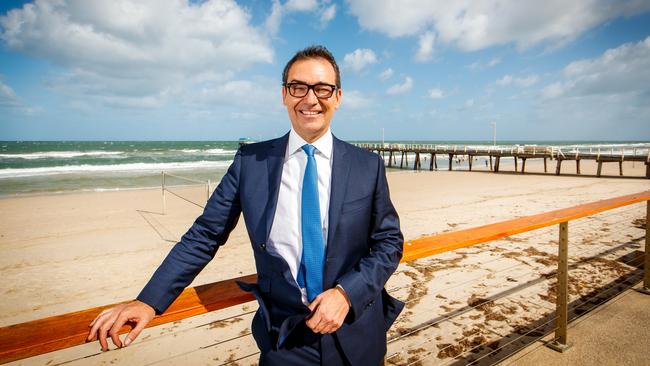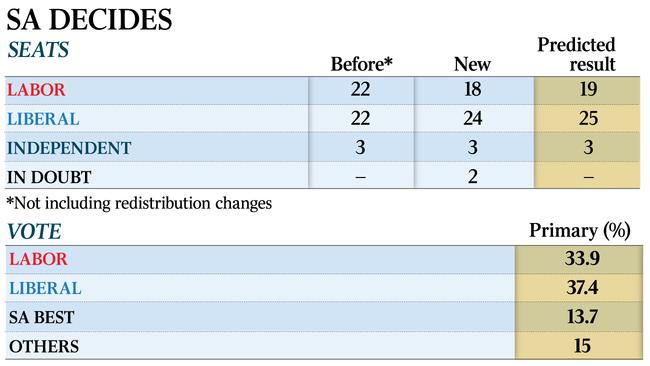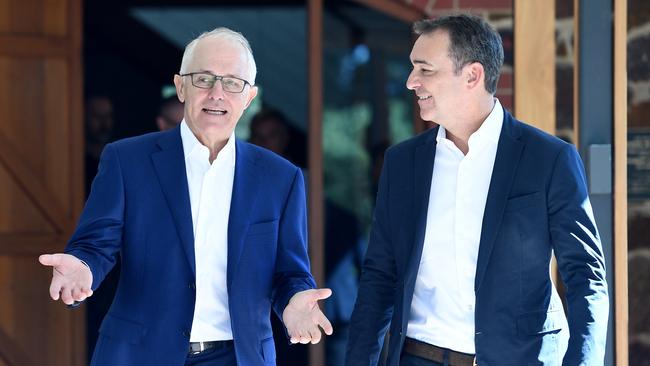Weatherill’s exit lifts National Energy Guarantee reform hopes
A change of government in South Australia has boosted the federal Coalition’s hopes of passing its national energy guarantee.

A change of government in South Australia over the weekend has boosted the federal government’s hopes of passing its national energy guarantee and could slow the state’s investment in new renewable power.
Prime Minister Malcolm Turnbull said the chances of the reform passing had “improved considerably”, while Energy Minister Josh Frydenberg, who led development of the policy, used the result to put pressure on Labor to drop plans for a higher renewable energy target.
Mr Turnbull yesterday described outgoing premier Jay Weatherill as a “ferocious opponent of the NEG” and claimed vindication in a result that Mr Weatherill had set up as a referendum on energy policy.

“He said it was a referendum; well, the people have spoken. And they have spoken in favour of our policies, which support affordable and reliable energy,” Mr Turnbull said. “Now you have a (new) South Australian premier who, like us, is committed to ensuring that we have affordable and reliable energy, that we meet our emissions reduction obligations, that we can keep the lights on, and afford to keep them on.”
South Australia had objected to further design work on the NEG being carried out by the Energy Security Board, chaired by Kerry Schott, unless it was accompanied by work on a Clean Energy Target and an Emissions Intensity Scheme.
But incoming premier Steven Marshall told The Australian yesterday he was committed to the national energy guarantee.
“Before the Finkel Review recommended it last year, I urged all the states to agree to a single renewable energy target,” Mr Marshall said. “We must end states going off on frolics of their own and experimenting with something as vital as affordable and reliable electricity.
“Accordingly, the South Australian Liberal government will work with the federal government and all the other jurisdictions in the national electricity market — Labor and Liberal — to put in place a national energy guarantee providing affordable and reliable power and offering a future for investment in whatever technology is needed by the market, including renewable energy.”
Mr Frydenberg said the election of the Marshall government in South Australia was a vote for a “sensible energy policy” and a “more affordable, reliable energy system”.
“South Australians have made their opinion clear and voted emphatically to reject Labor’s energy policy. They have instead supported Steven Marshall’s commitment to the national energy guarantee, which will result in lower prices and greater reliability as we transition to a lower emissions future,” he said.
State and federal energy ministers will next month be presented with the first details of how the NEG, which aims to marry environment and energy policy, will work. The chances of success were boosted last week when Ms Schott said the policy would be developed to accommodate states with separate renewable energy targets. But she said those states would have a higher reliability target imposed on them through the NEG to ensure that any additional generation capacity was available to the market at times when conditions were against wind and solar generation.

“The national energy guarantee is a unique opportunity to break with the subsidy mentality of the past and adopt a truly technology-neutral policy that delivers a more affordable, reliable and sustainable energy system,” Mr Frydenberg said.
“The commonwealth looks forward to working with the Marshall government and other jurisdictions through the COAG Energy Council to deliver the NEG and the investment certainty the energy sector needs.
“Under the NEG, Australian families will be on average $300 a year better off when compared to Bill Shorten’s plan. Businesses will benefit from a 23 per cent reduction in wholesale costs, allowing them to expand their business, make new investments and create more jobs.”
States retain control over energy policy and must agree to any change affecting the national electricity market. By custom the legislation resulting from any agreement must be passed by the SA parliament before it is adopted by the other states, and observers said having a Coalition party in government would remove some of the obstacles to the NEG.
“It is more likely now that Josh Frydenberg has a credible pathway to get the NEG passed,” said Grattan Institute energy policy head Tony Wood.
SA Liberals went to the election with a policy that included providing $100m in means-tested loans to install batteries in 40,000 homes, as well as a $200m fund to improve the state’s connections to the national grid, likely through the addition of an interconnector to NSW to supplement the sole Victorian link.
The party also committed to retain, until 2019, back-up diesel generation brought in by the Weatherill government to head off a repeat of 2016-17 blackouts that put the state in the forefront of the national energy debate. But beyond 2019 Mr Marshall has vowed to hold a reverse auction for emergency generation and junk Mr Weatherill’s plan to build a new peaking gas generator.
Additional reporting: Michael Owen





To join the conversation, please log in. Don't have an account? Register
Join the conversation, you are commenting as Logout